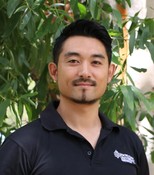
Dr Takahiro Shimada ~ Adjunct Senior Research Fellow
Marine & Aquaculture Sciences
- About
-
- Interests
-
- Research
-
- Animal movements in relation with the environments.
- Interaction between animals and humans in spatial and temporal terms.
- Protected area management
- Experience
-
- 2015 to present - Postdoctoral Research fellow, James Cook University (Townsville)
- 2017 - Senior Conservation Officer, Department of Environment and Heritage Protection (Townsville)
- Research Disciplines
- Socio-Economic Objectives
Dr Takahiro Shimada is a post-doctoral research fellow at the College of Science and Engineering. He grew up in Japan, completed a BSc in Agriculture at Meiji University (2002), a Masters in Science at the University of Tokyo (2012), and a PhD at James Cook University (2016). He is specialised in movement ecology using telemetry (e.g. GPS, Argos, time-depth recorder, accelerometer) and molecular techniques (e.g. stable isotope). He is also a developer of the R package SDLfilter, which is designed to screen satellite-derived location data. Current focus of his research is spatial ecology and conservation of sea turtles.
- Publications
-
These are the most recent publications associated with this author. To see a detailed profile of all publications stored at JCU, visit ResearchOnline@JCU. Hover over Altmetrics badges to see social impact.
- Journal Articles
-
- Hamann M, Shimada T, Duce S, Foster A, To A and Limpus C (2022) Patterns of nesting behaviour and nesting success for green turtles at Raine Island, Australia. Endangered Species Research, 47. pp. 217-229
- Perez M, Limpus C, Hofmeister K, Shimada T, Strydom A, Webster E and Hamann M (2022) Satellite tagging and flipper tag recoveries reveal migration patterns and foraging distribution of loggerhead sea turtles (Caretta caretta) from eastern Australia. Marine Biology, 169.
- Barr C, Hamann M, Shimada T, Bell I, Limpus C and Ferguson J (2021) Post-nesting movements and feeding ground distribution by the hawksbill turtle (Eretmochelys imbricata) from rookeries in the Torres Strait. Wildlife Research, 48 (7). pp. 598-608
- Shimada T, Thums M, Hamann M, Limpus C, Hays G, FitzSimmons N, Wildermann N, Duarte C, Meekan M and (2021) Optimising sample sizes for animal distribution analysis using tracking data. Methods in Ecology and Evolution, 12 (2). pp. 288-297
- Barrios-Garrido H, Shimada T, Diedrich A and Hamann M (2020) Conservation and enforcement capacity index (CECi): integrating human development, economy, and marine turtle status. Journal of Environmental Management, 262.
- Shimada T, Limpus C, Hamann M, Bell I, Esteban N, Groom R and Hays G (2020) Fidelity to foraging sites after long migrations. Journal of Animal Ecology, 89 (4). pp. 1008-1016
- Diedrich A, Blythe J, Petersen E, Euriga E, Fatchiya A, Shimada T and Jones C (2019) Socio-economic drivers of adoption of small-scale aquaculutre in Indonesia. Sustainability, 11 (6).
- Espinoza-Rodriguez N, De Turris-Morales K, Shimada T and Barrios Garrido H (2019) Guiana dolphin (Sotalia guianensis) in the southern Gulf of Venezuela: seasonal distribution, group size, and habitat use. Regional Studies in Marine Science, 32.
- Shimada T, Limpus C, Jones R and Hamann M (2017) Aligning habitat use with management zoning to reduce vessel strike of sea turtles. Ocean & Coastal Management, 142. pp. 163-172
- Shimada T, Jones R, Limpus C, Groom R and Hamann M (2016) Long-term and seasonal patterns of sea turtle home ranges in warm coastal foraging habitats: implications for conservation. Marine Ecology Progress Series, 562. pp. 163-179
- Shimada T, Jones R, Limpus C and Hamann M (2016) Time-restricted orientation of green turtles. Journal of Experimental Marine Biology and Ecology, 484. pp. 31-38
- Shimada T, Limpus C, Jones R, Hazel J, Groom R and Hamann M (2016) Sea turtles return home after intentional displacement from coastal foraging areas. Marine Biology, 163 (8). pp. 1-14
- More
-
ResearchOnline@JCU stores 16+ research outputs authored by Dr Takahiro Shimada from 2012 onwards.
- Collaboration
-
The map shows research collaborations by institution from the past 7 years.
Note: Map points are indicative of the countries or states that institutions are associated with.- 5+ collaborations
- 4 collaborations
- 3 collaborations
- 2 collaborations
- 1 collaboration
- Indicates the Tropics (Torrid Zone)
My research areas
Similar to me
-
Prof Mark HamannMarine & Aquaculture Sciences
-
A/Prof Amy DiedrichEarth & Environmental Science
-
Prof Ellen ArielBiomedical Sciences and Molecular Biology
-
Dr Hector Barrios-GarridoTropWater
-
Dr Caroline PetusTropWater

